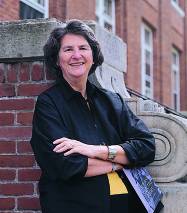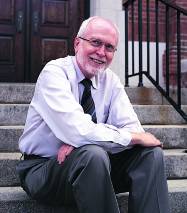Retiring Faculty
Helen D. Lockwood Professor of English Barbara Page arrived at Vassar in 1969, along with coeducation. “It was exciting and exhilarating,” she says, to be present when faculty, administrators, alumnae/i, and, not least, students faced the challenge of rethinking the institution from top to bottom. “It was a brave venture, and my very individualistic students were aware of themselves as pioneering, especially the men.”

But this is just the sort of teaching atmosphere in which Page thrives. “I like to take the point of controversy and address it,” she says. And she follows this basic pedagogical approach whether teaching an intro course—Introduction to Women’s Studies, for example—or her senior seminar on contemporary poets, her current academic specialty.
A noted scholar of the poetry of Elizabeth Bishop ’34, Page helped found the women’s studies department in the early ’80s and served as its director for five years. She also chaired the English department for five years and served as associate dean of the faculty for two years and acting dean of the faculty for nearly three.
To occupy some of the time she will now spend away from the classroom, Page is at work on a book, with a co-author who is a Brazilian native, that will help illuminate “what North Americans don’t know about Elizabeth Bishop’s life in Brazil.” Tentatively titled “Driving to the Interior”: Elizabeth Bishop in Brazil, the book, Page hopes, will fill in social, political, and historical contexts that will allow fuller understanding of certain aspects of Bishop’s poetry.
Professor of Classics Robert Pounder first came to Vassar in 1972, fresh from Brown University’s Ph.D. program, to fill a temporary position. Following a stint as assistant to the director of the American School of Classical Studies in Greece, Pounder returned to Vassar for a permanent position in 1975. “I can’t divorce myself from Vassar,” says Pounder. “The values and traditions of Vassar are mine, too; the college becomes just as much a part of you as you are a part of it.”

Leaving teaching behind again in 1989, Pounder served as assistant to former Vassar President Frances Fergusson. “I found working with Fran to be a rewarding experience that was personally and intellectually enriching,” he recalls—so much so that what began as a two- or three-year term expanded to 15 years of work in the president’s office.
Pounder well understood his role in bringing a faculty perspective to senior officers’ meetings, but also came to cherish his increased interaction with alumnae/i in his new role. Working with the president and the board of trustees allowed him to further his relationship with Richard Van Demark ’77, former chair of the board and a friend of Pounder’s since Van Demark’s time as an undergraduate. And, as Pounder is quick to add, the chance to work with so many other distinguished members of the board was enormously gratifying.
Two years ago Pounder returned to teaching and has followed new research pursuits, including a biographical project on four American archaeologists (including two Vassar alumnae) working in Greece in the early 1900s, which he hopes to develop into a book.
Photo Credits: Jim Smith
